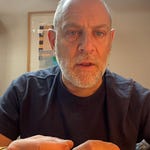Playback speed
×
Share post
Share post at current time
Share from 0:00
0:00
/
0:00
Transcript
Imagine: Not just Us but All of Us.
Weekly Recap of Below the Bible Belt
Jan 26, 2024
The deepest source of tension between us is the tug between the tribal and the universal. Am I loyal to my people - or all people? Can we grow global to expand our empathy beyond same old borders and boundaries of belonging?
This is the tragedy unfolding in Israel and Palestine, Jewish AND/or Democratic? Can we co-create a civil civic society that equally honors all people or will this be a jewish supremacy? This is the tension ripping apart those of us who are Jewish and trying to reconcile our love of our people and our universal humanistic values. It’s what’s ripping apart the US with America First up against We the People.
This either/or tension of binaries has defined us for generations. But there have always been prophetic voices that imagined a better way to be - where we are not just us - but all of us.
One of those prophets is the lesser known Joel, son of Pethuel, a mysterious minor visionary who just joined us, briefly, on our @belowthebiblebelt929 journey to read daily through all 929 chapters of the Hebrew Bible, now finding us in the Twelve Minor Prophets section, spanning 400 years of historical Jewish drama. Joel left behind just four chapters of prophetic political poetry.
Unlike most of the other prophets whose words are well documented in specific historical context which helps explain their pain, rage and need for consolation, Joel’s history is vague and continues to intrigue readers and scholars. He doesn’t locate his visions in historical context, he doesn’t mention any king or specific battle.
On the one hand it doesn’t matter because his story and messages transcend time. But on the other hand - he leaves behind a few clues, and they help us not just know where and when he lived and which political reality he protested - but also help us learn something important about what his hidden message may still mean to us, right now, at this political moment.
His bold message has to do with the slow gradual and painfully patient process of democracy. He imagines a universal reality - beyond tribal. He imagines prophecy belonging to everybody, not just the chosen few.
In this third chapter he imagines the future in which -
“I will pour out My spirit on all flesh;
Your sons and daughters shall prophesy;
Your elders shall dream dreams,
And your youths shall see visions...I will even pour out My spirit
Upon male and female slaves..”
This vision would be quoted in the New Testament and echoed for centuries but it’s Joel who said it first --
He imagines a new religious reality where we need less leaders and trust each other to channel the visions of what’s good. It’s a lot to ask and maybe messy but what’s the context for this vision and how can it help us?
Most scholars place Joel in the mid 6th century BCE - known as the early restoration period in Judah - it’s just two generations after the trauma of Jerusalem’s destruction by Babylon in 586 BCE - and the restoration of Jerusalem under the Persians - in 520 BCE. Sort of like now? Two generations post Holocaust with a still young-ish Israel figuring out what it’s all about?
Joel may be among those pioneer Judeans who were motivated to move back to Judah and resettle the land, with Persian permission, while most of their people stayed behind in Babylon’s growing diaspora.
These are the early tensions of the diaspora-holy land realities - tribal/universal. And thats not the only tension -- One of the important gradual changes that was shared by both communities was the shift from the old prophets to the growing role of priests -- from the old religion to a newer version, a gradually more participatory and eventually more egalitarian - religion. He lived at the time of this gradual shift in what is religious leadership -- prophets out, priests in, and the next phase would be the sages and rabbis.
What Joel is hinting at is not just the future - but the emerging religious political reality he was living through - people started to decode or download wisdom, mysteries, divine messages - not through seers and visionaries - but, gradually, through discourse and learning, that would eventually become own complex systems and power structures.
Joel was telling them - and us - that there is another paradigm of access to the sacred, and there is a redemptive roadmap - towards more democratic, inclusive access, shared by all and not just by some -- beyond gender, class, ethnic, race or orientation - everybody is a prophet. All of us have a piece of the puzzle - and more of us can help tell truth to power and only all of us will rise to make it work for all of us - not just some of us. This may be the radical universal message Joel is telling us today. Can we negotiate the old ways of belonging with the new ones that invite more of us to care for and with all of us -- for a future where we fix this world - together? That’s an ancient prophet telling us to try.
S0 let’s. Thank you for joining me below the bible belt. We’ve got this. Wishing hope and healing, peace and prophecies of equal care and dignity for all.
Shabbat Shalom.
Recent Posts












Share this post